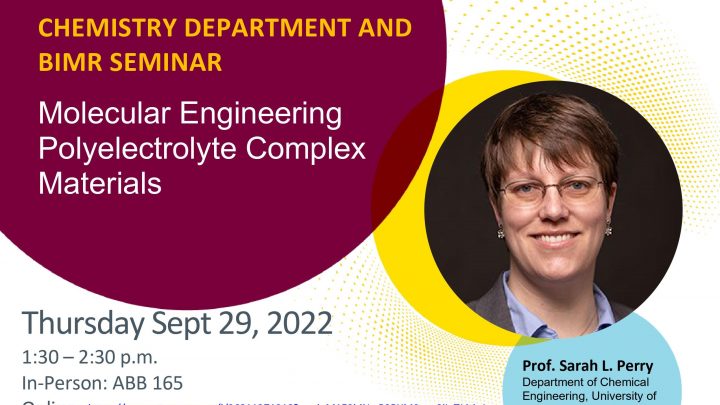Molecular Engineering Polyelectrolyte Complex Materials
Sep 29, 2022
1:30PM to 2:30PM

Date/Time
Date(s) - 29/09/2022
1:30 pm - 2:30 pm
Categories
Sarah L. Perry (perrys@engin.umass.edu)
Department of Chemical Engineering, University of Massachusetts Amherst
Electrostatic interactions and polyelectrolyte complexation can be used in the self-assembly of a wide range of responsive, bioinspired soft materials ranging from dehydrated thin films, fibers, and bulk solids to dense, polymer-rich liquid complex coacervates, as well as more complex hierarchical structures such as micelles and hydrogels. This responsiveness can include swelling and dissolution or solidification, which can be harnessed to facilitate encapsulation and the subsequent fabrication of functional materials. In particular, we draw inspiration from biomolecular condensates, or membraneless organelles, which utilize liquid-liquid phase separation to create transient compartments in cells. These condensates are commonly formed due to weak, multivalent interactions involving intrinsically disordered proteins, and have been shown to enable the selective uptake of specific proteins, DNA/RNA, and small molecule drugs. We study how the patterning or presentation of charges and other chemical functionalities can modulate the potential for liquid-liquid phase separation via complex coacervation. We further examine how the distribution of charge on globular proteins can be used to facilitate selective uptake into coacervate phases, and how coacervate materials can be used to stabilize proteins and viruses against denaturation. This molecular-level understanding of polyelectrolyte complexation is further enhanced by detailed dynamic mechanical and thermodynamic examinations of the molecular nature of the various material transitions present in these systems. Our experimental efforts are supported by the parallel development of computational approaches for modeling and predicting the phase behavior of patterned polymeric materials. Our goal is to establish molecular-level design rules to facilitate the tailored creation of materials based on polyelectrolyte complexation that can both illuminate self-assembly phenomena found in nature, and find utility across a wide range of real-world applications.
Bio:
Sarah L. Perry received BS degrees in Chemical Engineering and Chemistry from the University of Arizona, as well as a MS in Chemical Engineering working on gas phase methods for chemically passivating silicon surfaces for semiconductor manufacturing. She received her PhD from the University of Illinois at Urbana-Champaign working on microfluidic platforms for the crystallization and study of membrane protein crystallization with Prof. Paul J.A. Kenis. She began working as a postdoc for Prof. Matthew Tirrell in the Bioengineering Department at the University of California at Berkeley and moved with the lab to the Institute for Molecular Engineering at the University of Chicago. Her initial research in the Tirrell Group focused on the use of self-assembling DNA-lipid films for use in transfection. She then expanded her research to investigate the self-assembly, structure, and physics of biomimetic polyelectrolyte systems known as complex coacervates for use as artificial organelles or nanoreactors.
Prof. Perry loves to teach and mentor students. She teaches ENGIN 110 – Introduction to Chemical Engineering in the Fall semester because of the opportunities that it presents to build excitement about the field of chemical engineering and to help students build skills to help ensure future success. In the Spring semester, Prof. Perry teaches an elective class on Microfluidics and Microscale Analysis in Materials and Biology. This class is open to both undergraduate and graduate students from across the Five College System, and is designed to give students basic knowledge and skills related to microfluidic technology, and then give them the opportunity to use these skills to develop a microfluidic platform that addresses a current need in the real world. Students are encouraged to bring a project to the class related to their own research, or can work on a project sponsored by a lab or company.
In her spare time, Prof. Perry enjoys snuggling with two out of her three cats (one of them is very standofish), working in her yard, training in Taekwondo, and doing arts and crafts.

